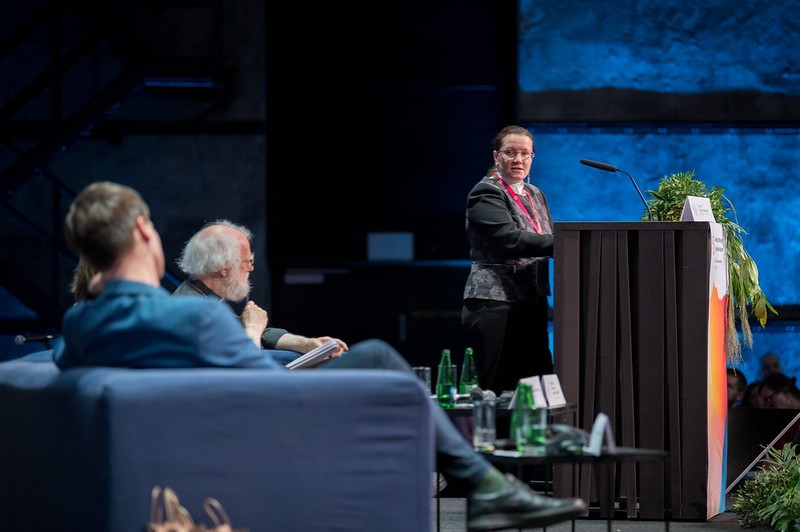
Photo: Albin Hillert/CEC
Feature article No: 02/23
20 June 2023
Tallinn
The CEC General Assembly ended on 20 June in Tallinn, highlighting the diversity of CEC Member Churches, electing new leadership and formulating new strategies on how churches under God’s blessing may shape the future. On the last day of the assembly, participants reflect on what the assembly means to them ecumenically speaking.
Maria Cristina Milea is a delegate from the Romanian Orthodox Church in western and southern Europe. Maria is a volunteer in her church in Paris and focused on youth activities. This is her first visit to a CEC assembly. “We have the same God, even if not necessarily the same theology.”
At the assembly she is a part of the pastoral care team.
“I would like to give everybody a voice, common for all Christians. We are here for a reason and it is an ecumenical matter. All churches want to be present contextually.”
She appreciated that she could be a member of the pastoral care team even though she is a lay-person.
“I appreciate the sign of inclusion that I have witnessed at the assembly”.
Bishop Emeritus Atle Sommerfeldt is representing the Church of Norway and has been involved in ecumenism since 1970s. “I see CEC as a way to connect the churches in Europe, and to work on common issues such as racism, climate justice, human rights, minorities and exclusive nationalism. We must address these issues when participating in forming the new Europe.”
He also believes CEC has an important role as a space where people and actors can work together across the divisions in Europe and embody what the Church is called to be.
“CEC has a significant role to play to influence the European policymakers, especially EU and the Council of Europe. CEC has a bright future as a European church organisation if and when it takes the opportunities open to it and mobilises the resources of the large family of CEC for joint action.”
As a bishop emeritus this will be his last ecumenical assembly.
“For me, the sending mass will be my finale. It will be an emotional moment for me to experience, ending forty-five years of participation in ecumenical assemblies and events.”
Eva Guldanova is a delegate representing the Evangelical Church of the Augsburg Confession in Slovakia. This is her third assembly but her first time as a delegate. She comes with two roles as a secretary for foreign relations and the chair of the ecumenical committee of her church.
She describes herself as a passionate ecumenist, whose journey started almost twenty years ago.
“In my country, my church is a minority. At university I was invited to a Catholic Bible study group - they became my brothers and sisters, even though I am a Lutheran”. Even though she found the experience spiritually nourishing and found joy in the ecumenical fellowship, she also felt pain for not being able to share the sacraments with the group.
“I decided to become involved in the ecumenical movement to work for change. I now see even better the beauty of diversity and how I can contribute. We should remind ourselves to nourish one another and we should work with each other instead of competing with one another”.
By Emelie Simmons of the Church of Sweden